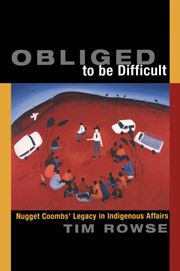Book contents
- Frontmatter
- Contents
- Acknowledgements
- Introduction
- 1 The modest mandate of 1967
- 2 ‘Land ownership for Aborigines presents difficult problems’
- 3 Mediating the Yolngu
- 4 Voice and feet
- 5 North and south
- 6 A national indigenous leadership?
- 7 Clans and councils
- 8 ‘As nasty a piece of chicanery as I can remember’
- 9 Effectively Aboriginal
- 10 An indigenous public sphere
- 11 From James Cook to Eva Valley
- 12 The 1940s in the 1990s
- Conclusion: Beyond Howard, Hanson and Herron
- References
- Notes
- Index
10 - An indigenous public sphere
Published online by Cambridge University Press: 01 June 2011
- Frontmatter
- Contents
- Acknowledgements
- Introduction
- 1 The modest mandate of 1967
- 2 ‘Land ownership for Aborigines presents difficult problems’
- 3 Mediating the Yolngu
- 4 Voice and feet
- 5 North and south
- 6 A national indigenous leadership?
- 7 Clans and councils
- 8 ‘As nasty a piece of chicanery as I can remember’
- 9 Effectively Aboriginal
- 10 An indigenous public sphere
- 11 From James Cook to Eva Valley
- 12 The 1940s in the 1990s
- Conclusion: Beyond Howard, Hanson and Herron
- References
- Notes
- Index
Summary
Since the demise of the Council for Aboriginal Affairs in November 1976, Coombs had been a research fellow in the Centre for Resource and Environmental Studies, one of the few inter-disciplinary and policyoriented research sites within the ANU. This change in his formal position – from government servant to academic – enabled him to comment freely on what the Fraser government was doing in the uranium province, and it had licensed Viner to upbraid him for his affinities with ‘outside agitators.’
In this new public estrangement from the government, Coombs revised his conception of his public duty. According to his close friend, Judith Wright, when the Fraser government rejected Coombs' criticisms of the Ranger process, he felt that his obligation to Holt's 1967 commission had been acquitted. Although Coombs' ‘view of his own role as a servant of the public and therefore of its elected government [was] almost too scrupulous’, his horror at the Ranger process justified his ‘stepping outside his former role as a public servant and adviser, into unofficial action’.
Coombs' step into ‘unofficial action’ was soon to alter more than his relationship with the government. As this chapter will show, Coombs' position within an emerging debate among indigenous Australians was also becoming more delicate.
The treaty
In re-fashioning himself as a more outspokenly critical public intellectual, Coombs led a debate on a treaty with indigenous Australians.
- Type
- Chapter
- Information
- Obliged to be DifficultNugget Coombs' Legacy in Indigenous Affairs, pp. 174 - 192Publisher: Cambridge University PressPrint publication year: 2000

